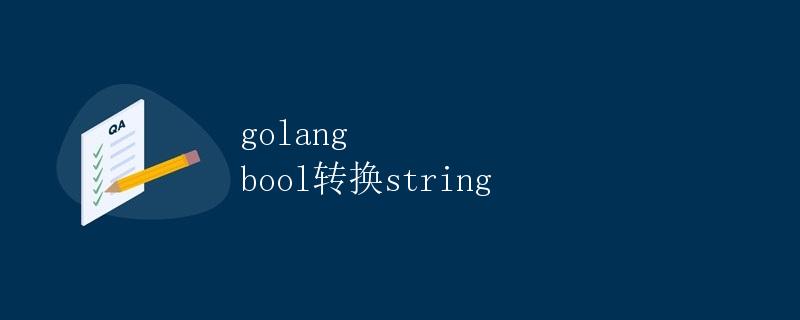Golang bool转换string

1. 前言
在编程过程中,我们经常需要将bool类型的数据转换成string类型的数据。在Go语言中,bool类型只有两个取值:true或false。本文将介绍如何在Go语言中将bool类型转换成string类型。
2. bool类型与string类型的转换
在Go语言中,bool类型可以通过两种方式转换成string类型:使用strconv包中的函数和使用fmt包中的格式化输出。
2.1 使用strconv包转换
Go语言的strconv包提供了很多用于转换数据类型的函数,包括将bool类型转换成string类型的函数strconv.FormatBool和将string类型转换成bool类型的函数strconv.ParseBool。下面是使用strconv包进行bool类型和string类型的转换的示例代码:
package main
import (
"fmt"
"strconv"
)
func main() {
// bool类型转换成string类型
boolValue := true
strValue := strconv.FormatBool(boolValue)
fmt.Printf("boolValue: %v, strValue: %s\n", boolValue, strValue)
boolValue = false
strValue = strconv.FormatBool(boolValue)
fmt.Printf("boolValue: %v, strValue: %s\n", boolValue, strValue)
// string类型转换成bool类型
strValue = "true"
boolValue, _ = strconv.ParseBool(strValue)
fmt.Printf("strValue: %s, boolValue: %v\n", strValue, boolValue)
strValue = "false"
boolValue, _ = strconv.ParseBool(strValue)
fmt.Printf("strValue: %s, boolValue: %v\n", strValue, boolValue)
}
运行以上代码,输出如下:
boolValue: true, strValue: true
boolValue: false, strValue: false
strValue: true, boolValue: true
strValue: false, boolValue: false
2.2 使用fmt包转换
Go语言的fmt包提供了格式化输出的功能,当bool类型作为参数传入Printf函数时,会根据bool值的真假输出”true”或”false”。下面是使用fmt包进行bool类型和string类型的转换的示例代码:
package main
import "fmt"
func main() {
// bool类型转换成string类型
boolValue := true
strValue := fmt.Sprintf("%v", boolValue)
fmt.Printf("boolValue: %v, strValue: %s\n", boolValue, strValue)
boolValue = false
strValue = fmt.Sprintf("%v", boolValue)
fmt.Printf("boolValue: %v, strValue: %s\n", boolValue, strValue)
}
运行以上代码,输出如下:
boolValue: true, strValue: true
boolValue: false, strValue: false
从输出可以看出,使用fmt包对bool类型进行格式化输出,可以直接得到bool类型对应的string值。
3. 总结
本文介绍了在Go语言中将bool类型转换成string类型的两种方法:使用strconv包和使用fmt包。使用strconv包中的strconv.FormatBool函数可以将bool类型转换成string类型,而使用fmt包中的格式化输出可以直接得到bool类型对应的字符串值。根据具体的需求,选择合适的方法进行转换即可。
 极客教程
极客教程